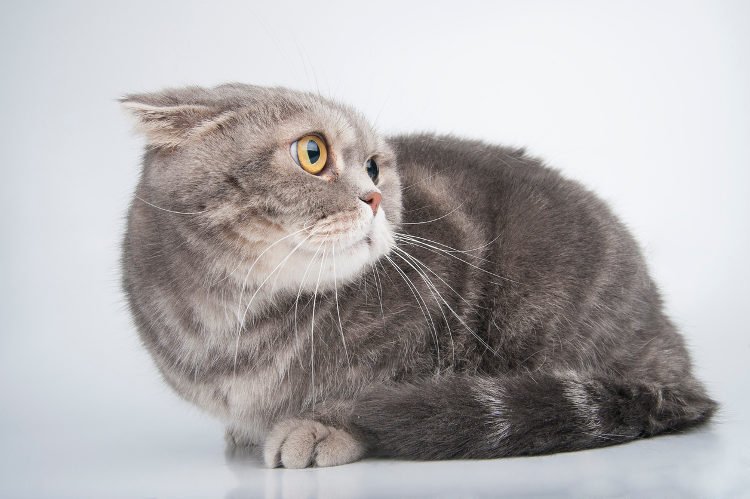Did you know that cats can experience anxiety? It’s true! Just like us, a traumatic experience or genetics or kittenhood experiences can shape the way an adult cat feels about the world. Isolate a kitten and you’ll have a feral cat. If a cat is abused with a cat carrier, they may have panic attacks over carriers in the future. Happily, with attentiveness and patience (and sometimes medication), you can help anxious cats relax and enjoy life.
TYPES OF CAT ANXIETY
Broadly, there are a few different types of anxiety and responses that your cat may have – either with or without a recognizable cause.
Separation Anxiety – Your kitty may express strong signs of anxiety based on your absence from the home. This type of anxiety generally occurs in cats with a history of neglect or abandonment, which can then become worse if the cat bounces between too many owners and homes.
Generalized Anxiety – Something in the home environment is making the cat fearful or stressed, though the cause may seem invisible or nonsensical. Perhaps a traumatic event occurred – such as an injury or a fall, or even moving house – and now your feline friend associates the past fear and trauma with a piece of furniture, a room, a person. Maybe the litter box is too dirty, or they’re being bullied by another pet.
Panic Attack – Something in the home causes the cat to experience a sudden and acute fear response; this could be due to a benign noise or action that your kitty sees as threatening. Perhaps the cat is afraid of thunder or sees another pet as threatening. Maybe they’re afraid of the cat carrier (or what the carrier means). Even when nothing bad happens, this trigger could continue to cause panic reactions in your pet.
RECOGNIZING ANXIETY IN YOUR CAT
Most owners will naturally recognize when their cat is uncomfortable and stressed. Any negative change of behavior could represent some inner turmoil, but here are a few definite examples:
- Hiding under or inside furniture, particularly from a person, pet, or event.
- Not using the litter box, and marking spaces with urine. (Alternatively: noticing diarrhea.)
- Trembling or crouched defensive body posture.
- Sudden flight or scrambling escape behavior.
- Self-injuring behavior, such as throwing their body at a cat carrier’s gate.
- Obsessive behavior like excessive grooming to the point of baldness or sores.
- Following their human from room to room without rest.
- Repetitive crying or meowing.
HOW TO TREAT YOUR CAT’S ANXIETY
If you’re concerned that your cat is suffering from anxiety, take them to the vet! Your vet will be able to do a complete examination and rule out physical causes for the kitty’s behavior. After all, excessive grooming could be caused by allergies. Their strange responses could be due to a problem with their brain or thyroid, or in reaction to something toxic.
If your vet is able to diagnose the anxiety as coming from an event (separation, trauma) or an individual (a person, a pet bully), there are a few treatment options they might suggest:
Behavioral Modification. If the anxiety stems from a particular trigger, you can work on changing your cat’s perception of that trigger. Through clicker training, play, and treats, along with positive reinforcement and praise, a negative object or event can slowly become neutral and acceptable.
Remember: don’t give positive encouragement like petting or treats to your cat when they’re showing the anxious behavior! This will only reinforce it. (I know this is hard. We want to love on our kitties when they’re upset, but it won’t help them.)
Environmental Change. Perhaps your home isn’t set up to help your cat feel safe and secure. Adding high places – like a tall cat tree or other perches that provide upward mobility – can give your cat a sense of security through multiple escape routes. If you have multiple cats, have multiple litter boxes. Give each of your pets their own food bowls so there’s no jockeying for resources, and make sure that all litter boxes, food, and water bowls have clear lines of sight all around them. (That way, nothing can sneak up on your kitty in a vulnerable position).
Medication. Your vet may prescribe anti-anxiety medication for your cat, from Prozac to Valium and more. These medications can help your cats relax and be more open to behavioral modification and environmental change while giving their bodies much-needed relief from frequent fear responses.
Having an anxious cat can be upsetting, but remember that you CAN help them. Just have patience, and help them work through it as you would with any other friend in your life. Your kitty will thank you.







My cat was 3 months when I got him..Mother was a stray and a woman started feeding her.She had kittens and they were put up for adoption.I adopted Quency one off the kittens.He is a very anxious cat.He is anxious and doesn’t want to be picked up or touched a lot except from me.He follows me a lot in the house ..I worry about.him.what can I do?I have used felaway on occasion .Helps alittle.